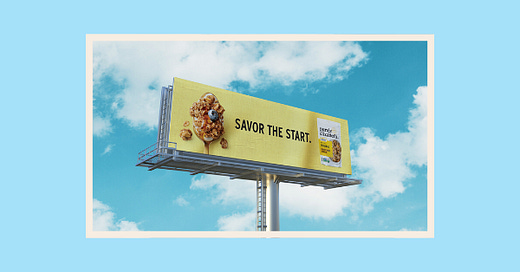Issue #18: Granola & GLP-1s
Analyzing Purely Elizabeth's new campaign within the current environment of GLP-1 weight-loss drugs.
Hey everyone! Hope you’re all enjoying the short week. This issue is a little later in the day than usual – I saw Tyler Childers at Madison Square Garden last night and didn’t have time to make my usual Wednesday night edits!
I’ve been hesitant to participate in the “How will Ozempic affect brands?” conversation for some time now. I have a lot of complex thoughts about GLP-1s, and the conversation opens up SO much about the diet industry and inequality and fatphobia that I don’t know if I have the time or space to fully tackle here on Brand Baby.
But when I saw that Purely Elizabeth launched their first national campaign last week, I was curious to explore how they navigated the campaign messaging in the current age of GLP-1 drugs. I’m a big fan of Purely Elizabeth and shamefully willing to shell out $10 for a bag of their granola.
I love how the ad pokes fun at our cultural obsession with extreme health practices, like ice bathing and attempts to embody Huberman-level health status (guilty as charged). It also jabs at our deep hope that practicing such extreme health practices will succeed in shielding us from our own mortality (“transcend your corporeal form”). Unlike some other health and wellness brands (read: Goop, Oura, Peloton, AG1), the ad shows that Purely Elizabeth doesn’t take themselves too seriously.
The “Savor the Start” campaign intends to demonstrate how one good decision can lead to another, which can lead to another, resulting in a bunch of positive wellness practices over time. In the era of weight-loss drugs, this insight is smart. With this campaign, Purely Elizabeth seeks to create an accessible entry point for healthy choices. Certain health products, like an Apple Watch or Peloton bike, are major financial investments that often lead to major lifestyle changes. If you’re buying a Peloton bike, then you’re probably going to adjust your lifestyle to make time for rides every single day, at least for a while.
GLP-1s are similar. They’re currently not super accessible due to high costs (though that is quickly changing!) and there is some risk involved (it’s a new drug, after all). They also tend to result in major changes to eating habits and lifestyles. But the drugs are effective.
Meanwhile, Purely Elizabeth is over here saying, ‘Hey! We’re an easy, low-risk way to start partaking in some healthy habits.’ While I don’t think Purely Elizabeth is opposed to GLP-1s in any way, their new campaign seeks to persuade audiences that they can still see big impacts from smaller choices, thus instilling a sense of empowerment and motivation.
While we know that GLP-1 users experience a reduction in appetite, it’s unclear how drug intake may affect consumption and the food industry. Will everyone continue to eat the same foods that we always have? Will product serving sizes get smaller? Or will we start seeing a decline in sales of processed foods and a surge in healthy options?
Preliminary research suggests that we’re already seeing some effects of GLP-1s on restaurant and takeout spending, as well as consumption of foods like ice cream, which Morgan Stanley predicts will decline by about 5% over the next ten years. On the flip side, they predict that items like soup, sports drinks, coffee, frozen diet meals, tea, granola and energy bars will see the least reduction in consumption.
What about ice cream and other non-’better for you’ foods, though? I think ice cream brands, for instance, should embrace selling ice cream! They may actually benefit from marketing their products as exactly what they are, rather than trying to become a better-for-you version. As GLP-1s can be highly controlling and limiting, I think brands have an opportunity to be really compelling and empowering for consumers by not trying to fit the mold of ‘better-for-you’ or ‘healthier.’
Thank you for reading! I would love to hear your thoughts on brands in this GLP-1 environment, and what you expect to see in the future.




